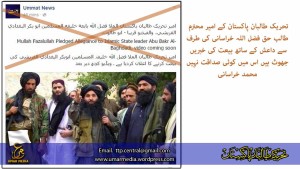There are frequent rumors that various jihadist groups are going to defect from the Taliban-al Qaeda axis and join the Islamic State. One organization that is often mentioned in this vein is the Pakistani Taliban (Tehrik-e-Taliban, or TTP). But earlier today a spokesman for the group, Muhammad Khorasani , denied the latest iteration of this gossip.
According to Khorasani, these reports are “based on lies.” Any claims that Mullah Fazullah, the head of the Pakistani Taliban, has sworn allegiance to “DAESH” (a derogatory Arabic acronym for the Islamic State’s name) are “false.”
An image posted by the TTP’s Umar Media, its official propaganda arm, shows a big “X” crossing out an account claiming that a video of Fazullah pledging allegiance to Abu Bakr al Baghdadi is “coming soon.” The image can be seen above.
The current Pakistani Taliban leadership has made it clear in the past that they wouldn’t be joining Baghdadi’s cause. In May of this year, the group published a pamphlet, which his nearly 60 pages long, rejecting the Islamic State’s “self-professed caliphate” in Iraq and Syria.
The publication, written by a jihadist known as Abu Usman Salarzai, purports to expose the errors in Abu Bakr al Baghdadi’s claim to be the new caliph. Salarzai praises Afghan Taliban leader Mullah Omar (who was thought to be alive at the time), as well as Osama bin Laden and his successor as the head of al Qaeda, Ayman al Zawahiri.
However, the Islamic State has picked off some disaffected Pakistani Taliban commanders. In January, a group of mid-level leaders pledged their loyalty to Baghdadi. In February, the Pakistani Taliban’s emir for the tribal agency of Bajaur also defected to the Islamic State’s side.
The defections came after internal discord and disputes dissolved the original Pakistani Taliban coalition last year. The TTP has always been an alliance of several jihadist groups in northern Pakistan, and some of the founding members decided to break away to run their own operations for a time.
Still, al Qaeda and the Afghan Taliban never lost all of their allies in the Pakistani Taliban.
In March, a major faction calling itself the Pakistani Taliban Jamaat ul Ahrar decided to rejoin the TTP umbrella organization. In addition, another jihadist group named Lashkar-i-Islam also decided to join the Pakistani Taliban. [See LWJ report, Pakistani jihadist groups, Lashkar-i-Islam merge into the Movement of the Taliban in Pakistan.]
There are indications that al Qaeda led the effort to reunite the jihadists.
In May of this year, Matiur Rehman, a veteran al Qaeda leader, united three jihadist groups under his command and then folded them into the Pakistani Taliban. The US Treasury Department has described Rehman as “a planning director for al Qaeda.” Rehman has been connected to multiple planned attacks against the West, including al Qaeda’s 2006 London airliner plot and a thwarted attempt to bomb trains in the New York City area in 2009. [See LWJ report, 3 jihadist groups merge with Movement of the Taliban in Pakistan.]
Rehman’s presence in the newly-constituted TTP is a strong sign that al Qaeda plays a significant role in guiding the coalition. There are other pieces of evidence along these lines as well.
In April, Pakistani Taliban spokesman Khorasani released a eulogy for Ustad Ahmad Farooq and Qari Imran, two al Qaeda in the Indian Subcontinent (AQIS) leaders who were killed in separate US drone strikes in January.
Khorasani said that Farooq oversaw Umar Media’s propaganda. “We would frequently meet for the purpose of media related tasks,” Khorasani explained. “During our meetings, if he [Farooq] would see any mistakes in any of our Umar Media productions or in any of my statements that I would release as the spokesman, he would point them out in a very kind and loving way, allowing me to benefit from his valuable suggestions.”
Khorasani said Imran was “among the greatest militant teachers.” Khorasani added that he and “thousands” of other jihadists trained under Imran.
“Thousands of young men received militant training from him [Imran] before going and dealing heavy strikes against the centers of the infidels,” Khorasani said. “I also gained my militant training from him.”
Therefore, the TTP’s statements issued this year, as well as other evidence, indicate a strong bond between its current leadership and al Qaeda. While it is always possible that one or more factions may defect, much of the TTP remains firmly in the Taliban’s and al Qaeda’s camp.









1 Comment
so everything’s a lie now! Yeah right. What makes this whole charade even more ridiculous is the US Intelligence Community presently being brought to task for skewing their own analysis, assessments, etc.,. What a joke